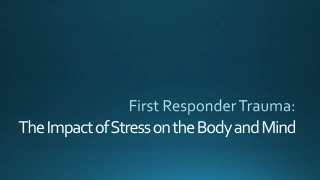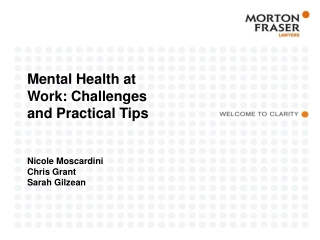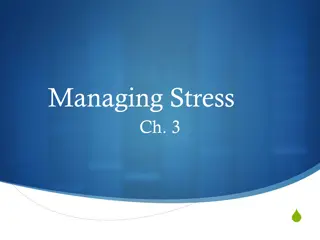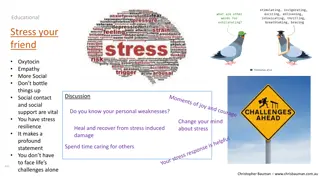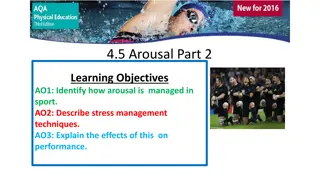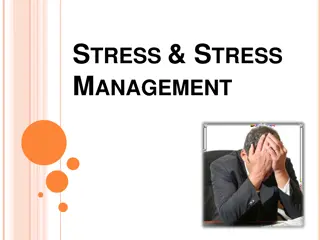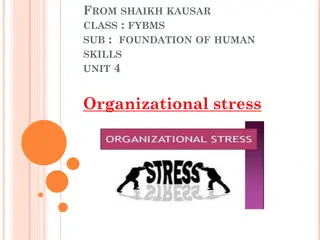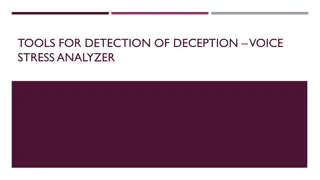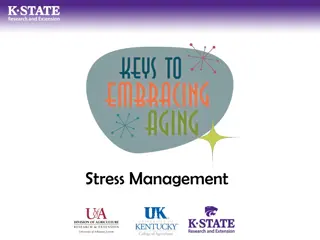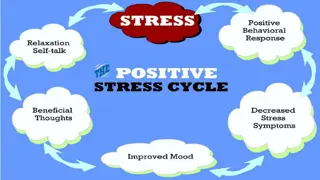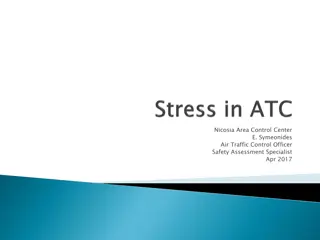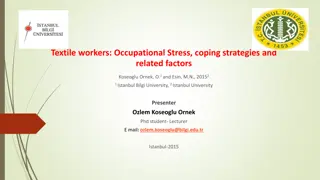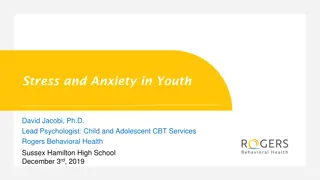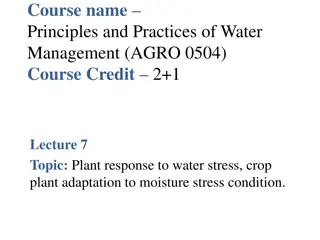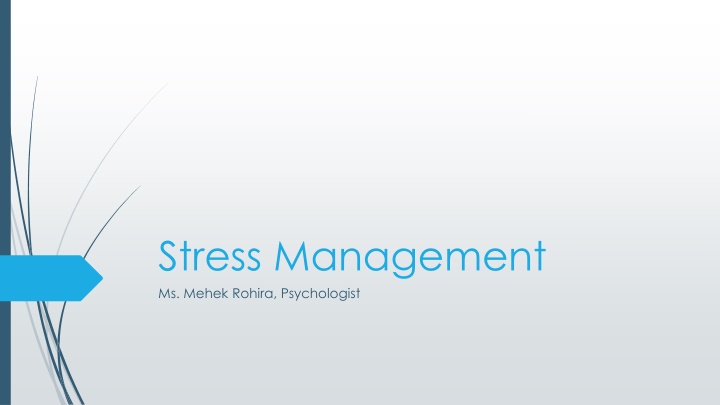
Managing Stress for a Healthier Life
Learn about the impact of stress on your physical and mental well-being, how to identify sources of stress, and effective stress management techniques. Take control of your life and prioritize self-care to lead a happier and more balanced lifestyle.
Download Presentation

Please find below an Image/Link to download the presentation.
The content on the website is provided AS IS for your information and personal use only. It may not be sold, licensed, or shared on other websites without obtaining consent from the author. If you encounter any issues during the download, it is possible that the publisher has removed the file from their server.
You are allowed to download the files provided on this website for personal or commercial use, subject to the condition that they are used lawfully. All files are the property of their respective owners.
The content on the website is provided AS IS for your information and personal use only. It may not be sold, licensed, or shared on other websites without obtaining consent from the author.
E N D
Presentation Transcript
Stress Management Ms. Mehek Rohira, Psychologist
What is Stress ? Stress is a normal psychological and physical reaction to the demands of life. A small amount of stress can be good, motivating you to perform well. Because life involves constant change ranging from everyday, routine changes like commuting from home to work to adapting to major life changes like marriage, divorce, or death of a loved one there is no avoiding stress. Over time, chronic stress can lead to serious health problems. Every day brings a choice, to practice stress or to practice peace
Effects of Stress Physical Effects Psychological Effects Mood swings Anxiety and fear Can lead to depression Tension and irritability Difficulty making decisions Difficulty concentrating Feeling numb Loss of interest in activities Anger Feeling powerless Crying Social isolation Obsessive and compulsive behaviours Weight gain/loss Unexpected hair loss Heart palpitations High blood pressure Sleep problems Fatigue Nausea Headaches, back pains, and stomach problems Low immunity Teeth grinding Panic attacks Usage of alcohol and drugs
How to manage stress ? Effective stress management helps you break the hold stress has on your life, so you can be happier, healthier, and more productive. The ultimate goal is a balanced life, with time for work, relationships, relaxation, and fun and the resilience to hold up under pressure and meet challenges head on. But stress management is not one-size-fits-all. That s why it s important to experiment and find out what works best for you. There are 3 points that are of importance when managing stress: Identification of the source of stress in your life Practice the 4 A s of Stress Management Avoid, Alter, Adapt & Accept Maintain balance with a healthy lifestyle Lean to manage stress before it manages you
Identify the source of stress in your life Stress management starts with identifying the sources of stress in your life. This isn t as straightforward as it sounds. While it s easy to identify major stressors such as changing jobs, moving, or a going through a divorce, pinpointing the sources of chronic stress can be more complicated. To identify your true sources of stress, look closely at your habits, attitude, and excuses: Do you explain away stress as temporary ( I just have a million things going on right now ) even though you can t remember the last time you took a breather? Do you define stress as an integral part of your work or home life ( Things are always crazy around here ) or as a part of your personality ( I have a lot of nervous energy, that s all )? Do you blame your stress on other people or outside events, or view it as entirely normal and unexceptional? Until you accept responsibility for the role you play in creating or maintaining it, your stress level will remain outside your control.
Practice the 4 As of Stress Management While stress is an automatic response from your nervous system, some stressors arise at predictable times: your commute to work, a meeting with your boss, or family gatherings, for example. When handling such predictable stressors, you can either change the situation or change your reaction. When deciding which option to choose in any given scenario, it s helpful to think of the four A s: Avoid unnecessary stress Alter the situation Adapt to the stressor Accept the things you cannot change The greatest weapon against stress is our ability to choose one thought over another
Avoid unnecessary stress Learn how to say no. Know your limits and stick to them. Whether in your personal or professional life, taking on more than you can handle can often lead to stress, learn to say no to taking on too much. Avoid people who stress you out. If someone consistently causes stress in your life, limit the amount of time you spend with that person, or end the relationship. Take control of your environment. If the evening news makes you anxious, turn off the TV. If traffic makes you tense, take a longer but less-traveled route. If going to the market is an unpleasant chore do your grocery shopping online. Avoid hot-button topics If you get upset over religion or politics, cross them off your conversation list. If you repeatedly argue about the same subject with the same people, stop bringing it up or excuse yourself when it s the topic of discussion. Cut down your to-do list analyse your schedule, responsibilities, and daily tasks. If you ve got too much on your plate, distinguish between the shoulds and the musts. Drop tasks that aren t truly necessary to the bottom of the list or eliminate them entirely.
Alter the situation If you can t avoid a stressful situation, try to alter it. Figure out what you can do to change things, so the problem doesn t present itself in the future. Often, this involves changing the way you communicate and operate in your daily life. Express your feelings instead of bottling them up. If something or someone is bothering you, be more assertive and communicate your concerns in an open and respectful way. If you don t voice your feelings, resentment will build, and the stress will increase. Be willing to compromise. When you ask someone to change their behavior, be willing to do the same. If you both are willing to bend at least a little, you ll have a good chance of finding a happy middle ground. Create a balanced schedule. All work and no play is a recipe for burnout. Try to find a balance between work and family life, social activities and solitary pursuits, daily responsibilities and downtime. Manage your time better. Poor time management can cause a lot of stress. When you re stretched too thin and running behind, it s hard to stay calm and focused. But if you plan ahead and make sure you don t overextend yourself; you can alter the amount of stress you re under.
Adapt to the stressor If you can t change the stressor, change yourself. You can adapt to stressful situations and regain your sense of control by changing your expectations and attitude. Reframe problems. Try to view stressful situations from a more positive perspective. Rather than fuming about a traffic jam, look at it as an opportunity to pause and regroup, listen to your favourite radio station, or enjoy some alone time. Look at the big picture. Take perspective of the stressful situation. Ask yourself how important it will be in the long run. Will it matter in a month? A year? Is it really worth getting upset over? If the answer is no, focus your time and energy elsewhere. Adjust your standards. Perfectionism is a major source of avoidable stress. Stop setting yourself up for failure by demanding perfection. Set reasonable standards for yourself and others and learn to be okay with good enough. Practice gratitude and focus on the positives. When stress is getting you down, take a moment to reflect on all the things you appreciate in your life, including your own positive qualities and gifts. This simple strategy can help you keep things in perspective.
Accept the things you cannot change Some sources of stress are unavoidable. You can t prevent or change stressors such as the death of a loved one, a serious illness, or a recession. In such cases, the best way to cope with stress is to accept things as they are. Acceptance may be difficult, but in the long run, it s easier than railing against a situation you can t change. Don t try to control the uncontrollable. Many things in life are beyond our control, particularly the behavior of other people. Rather than stressing out over them, focus on the things you can control such as the way you choose to react to problems. Look for the upside. When facing major challenges, try to look at them as opportunities for personal growth. If your own poor choices contributed to a stressful situation, reflect on them and learn from your mistakes. Share your feelings. Expressing what you re going through can be very cathartic, even if there s nothing you can do to alter the stressful situation. Talk to a trusted friend or make an appointment with a therapist. Learn to forgive. Accept the fact that we live in an imperfect world and that people make mistakes. Let go of anger and resentments. Free yourself from negative energy by forgiving and moving on.
Maintain balance with a healthy lifestyle Diet and nutrition: Eat a healthy diet. Well-nourished bodies are better prepared to cope with stress, so be mindful of what you eat. Start your day right with breakfast and keep your energy up and your mind clear with balanced, nutritious meals throughout the day. Reduce caffeine and sugar. The temporary highs caffeine and sugar provide often end in with a crash in mood and energy. By reducing the amount of coffee, soft drinks, chocolate, and sugar snacks in your diet, you ll feel more relaxed and you ll sleep better. Exercise: When you re stressed, the last thing you probably feel like doing is getting up and exercising. But physical activity is a huge stress reliever and you don t have to be an athlete or spend hours in a gym to experience the benefits. Exercise releases endorphins that make you feel good, and it can also serve as a valuable distraction from your daily worries. While you ll get the most benefit from regularly exercising for 30 minutes or more, it s okay to build up your fitness level gradually. Even very small activities can add up over the course of a day.
Maintain balance with a healthy lifestyle Sleep: Get enough sleep. Adequate sleep fuels your mind, as well as your body. Feeling tired will increase your stress because it may cause you to think irrationally. Getting enough sleep makes you feel energized Connect with others: There is nothing more calming than spending quality time with another human being who makes you feel safe and understood. In fact, face-to-face interaction triggers a cascade of hormones that counteracts the body s defensive fight-or-flight response. It s nature s natural stress reliever. So make it a point to connect regularly with family and friends. Of course, it s not always realistic to have a pal close by to lean on when you feel overwhelmed by stress, but by building and maintaining a network of close friends you can improve your resiliency to life s stressors. Spend time with positive people who enhance your life. A strong support system will buffer you from the negative effects of stress. Avoid substances: Avoid alcohol, cigarettes, and drugs. Self-medicating with alcohol or drugs may provide an easy escape from stress, but the relief is only temporary. Don t avoid or mask the issue at hand; deal with problems head on and with a clear mind.
Maintain balance with a healthy lifestyle Time management: Poor time management can cause a lot of stress. When you re stretched too thin and running behind, it s hard to stay calm and focused. There are things you can do to achieve a healthier work-life balance. o Don t over-commit yourself. Avoid scheduling things back-to-back or trying to fit too much into one day. o Prioritize tasks. Make a list of tasks you have to do and tackle them in order of importance. Do the high-priority items first. If you have something particularly unpleasant or stressful to do, get it over with early. The rest of your day will be more pleasant as a result. o Break projects into small steps. If a large project seems overwhelming, make a step-by-step plan. Focus on one manageable step at a time, rather than taking on everything at once o Delegate responsibility. You don t have to do it all yourself. If other people can take care of the task, why not let them? Let go of the desire to control or oversee every little step. You ll be letting go of unnecessary stress in the process. Humour: Keep your sense of humour. This includes the ability to laugh at yourself. The act of laughing helps your body fight stress in a number of ways.
Maintain balance with a healthy lifestyle Fun and leisure: If you regularly make time for fun and leisure activities, you ll be in a better place to handle life s stressors. Do something you enjoy every day. Make time for leisure activities that bring you joy, whether it be stargazing, playing the piano, or working on your bike. Rest and relaxation: Include rest and relaxation in your daily schedule. Don t allow other obligations to encroach. This is your time to take a break from all responsibilities and recharge your batteries. Relaxation techniques such as yoga, meditation, and deep breathing activate the body s relaxation response, a state of restfulness that is the opposite of the fight or flight or mobilization stress response. As you learn and practice these techniques, your stress levels will decrease, and your mind and body will become calm and centered. Me time: Don t get so caught up in the hustle and bustle of life that you forget to take care of your own needs. Beyond a take-charge approach and a positive attitude, you can reduce stress in your life by carving out me time. You can do things such as getting a massage, lighting candles, taking a long bath, listening to music, or anything that gives you peace. Nurturing yourself is a necessity, not a luxury.
Thank you! For any questions reach out to us info@emotionoflife.in

